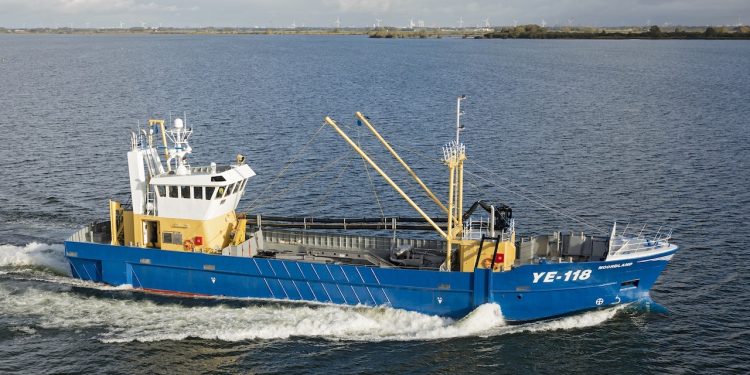As a key step towards full electrification, a Dutch razor shell dredger has been outfitted with a pioneering propulsion system at Daman Maaskant.
The 43-metre Noordland YE-118 underwent modifications back in 2015, and a couple of years ago the Daman Maaskant yard in Stellendam and the razor shell dredger’s owners Noordland BV started looking closely at the next step of reducing NOx emissions, which would enable the vessel to continue ot operate in certain areas.
‘In view of the new Wnb licence for the period 2024-2029, lowering nitrogen oxide emissions in Natura 2000 areas is necessary to receive enough fishing hours and continue fishing profitably. Together with Damen Maaskant, we started early so that we can be ready with this before the end of 2023,’ said skipper Robbert Mol.
YE-118 initally had two propulsion engines and two generators. At the yard, the conventional diesel propulsion engine on the port side was removed and replaced with a new 400kW electric motor in cooperation with Wetec. The result was a reduction of almost 500kW of total installed power and a reduction in emissions and maintenance costs.
Yerseke Engine Services (YES) replaced the existing C18 generator set with a Greenpower GPC18 generator set with ultra-low NOx mode in early 2023. An exhaust gas aftertreatment system with ultra-low NOx mode has now also been added to the existing starboard Caterpillar C18 main engine.
A special interface module that includes the location of all Natura 2000 areas has been added to this ultra-low NOx mode. This interface is linked to the on-board GPS. As soon as the vessel’s position falls within a Natura 2000 area, the system switches to ultra-low NOx mode and reduces emissions by more than 99%.
After successful sea trials earlier this month, YE-118 is already back on fishing grounds.
According to Damen Maaskant commercial manager Jeroen van den Berg, the shellfish and aquaculture sector is now ready for the transition to sustainability and energy efficiency, following the successful refit of the YE-118.
‘Exhaust gas after-treatment, electrification and the application of batteries are currently the best solutions available for this sector. In the future, this will include the application of e-fuels, which will require the same kind of drives and batteries. The YE-118 is now on the road to zero emissions thanks to this investment,’ he said.
Damen Maaskant and Damen’s research department (RD&I) have long been committed to the development and production of sustainable ships and are closely involved in solutions to create a future with minimal emissions and reductions in overall energy use on board ships.
In 2022, the shipyard won the sustainability award at the Shellfish Conference for developing ship engines with reduced CO2 and nitrogen emissions.
‘Thanks to the support of our network and local suppliers, we were able to achieve the refit of the YE118 with the successful result of reducing nitrogen oxide emissions in a very short lead time of ten days. The involvement and co-operation of the Dutch Human Environment and Transport Inspectorate also contributed positively to this,’ Jeroen van den Berg said.









